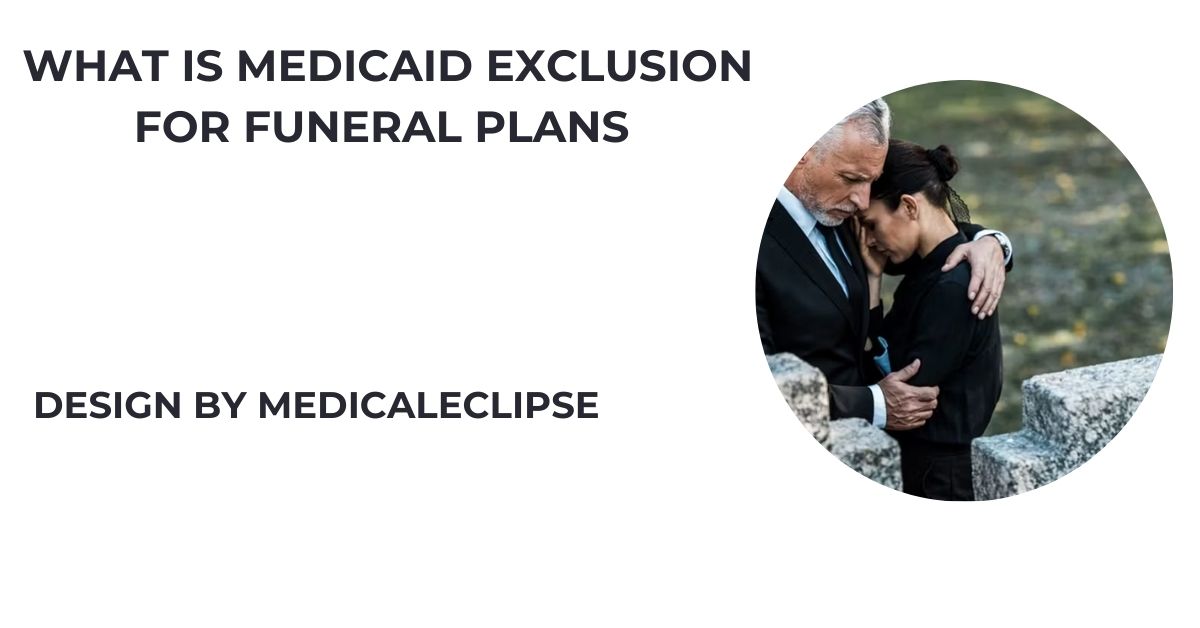Medicaid exclusion for funeral plans allows individuals to set aside funds for funeral expenses without affecting Medicaid eligibility. This ensures financial stability and preserves benefits.
In this article, we will delve into “What is Medicaid exclusion for funeral plans,” exploring its significance, how it works, and why it is a vital tool for financial and estate planning.
Understanding Medicaid Exclusion for Funeral Plans:

Medicaid is a needs-based program designed to assist low-income individuals with healthcare costs. To qualify, applicants must meet strict income and asset limits. These limits ensure that only those with financial need can receive Medicaid benefits. However, the program also recognizes that certain essential expenses, such as funeral and burial costs, should not count against an individual’s eligibility.
The Medicaid exclusion for funeral plans allows individuals to allocate specific funds for these expenses without those funds being included in the asset calculation. This ensures that applicants can plan for end-of-life costs while still qualifying for Medicaid coverage.
Types of Funeral Plans Covered by Medicaid Exclusion:
Irrevocable Funeral Trusts (IFTs):
- These trusts are legally binding and cannot be altered or canceled once established.
- Funds placed in an IFT are used exclusively for funeral and burial costs, ensuring they are protected from Medicaid asset calculations.
- IFTs offer flexibility in terms of the services they can cover, such as embalming, transportation, flowers, and other funeral-related expenses.
Prepaid Funeral Contracts:
- Applicants can prepay for specific services, including caskets, burial plots, cremation, and memorial services.
- To qualify for Medicaid exclusion, the contract must meet state-specific guidelines. For instance, some states require that the funds be placed in an irrevocable account.
- Prepaid contracts can often include customizable options, allowing individuals to make personal choices about their final arrangements.
Also Read: 5 Benefits of Smoking Food With Pellets
Burial Funds Exclusion:
- Medicaid allows individuals to set aside a specific amount (varies by state) in a designated burial fund.
- These funds must be clearly marked for burial expenses and kept separate from other financial accounts.
- In some cases, Medicaid may permit the purchase of burial items like headstones or grave markers as part of this exclusion.
Benefits of the Medicaid Funeral Exclusion:

Preserves Medicaid Eligibility:
By excluding funeral funds from asset calculations, applicants can maintain Medicaid eligibility without risking disqualification due to excess resources.
- This ensures that essential healthcare services remain accessible to those in need.
- Proper planning can safeguard both immediate benefits and long-term eligibility.
Relieves Family Burden:
Planning and funding funeral expenses in advance removes the financial and emotional burden from loved ones during a difficult time.
- Loved ones are spared the stress of making quick financial decisions during their grief.
- Families can honor the individual’s wishes without the added concern of unexpected costs.
Protects Assets from Medicaid Recovery:
Medicaid has the right to recover certain costs from an individual’s estate after their passing. However, funds set aside for funeral and burial expenses are typically exempt from this recovery process.
- This protection ensures that resources designated for burial are not depleted.
- It helps families preserve their inheritance and avoid financial strain.
Ensures Dignified Arrangements:
Preplanning allows individuals to make decisions about their funeral and burial, ensuring their wishes are respected and carried out.
- Individuals can customize their services to reflect personal or cultural preferences.
- A well-documented plan provides clarity and reduces family disputes over arrangements.
Also Read: Is Louisanan Medicaid Ran By Humans Or Computer – Humans and Technology in Medicaid Management!
State-Specific Rules:
While the Medicaid exclusion for funeral plans is federally recognized, each state has its own rules and limits regarding the types and amounts of allowable exclusions. For example:
- Some states cap the total amount that can be placed in an IFT or burial fund.
- Others have restrictions on which expenses qualify, such as excluding costs for non-essential items or luxury services.
It’s essential to consult a Medicaid planning expert or attorney to understand the regulations in your state. They can help you structure a funeral plan that complies with Medicaid guidelines while meeting your personal needs.
Steps to Set Up a Funeral Plan for Medicaid Exclusion:

Consult a Medicaid Planning Expert:
Professionals such as elder law attorneys or Medicaid planners can provide invaluable guidance. They understand the intricacies of Medicaid rules and can ensure your plan meets all requirements.
- They help identify which funeral expenses qualify for exclusions under Medicaid guidelines.
- Their expertise can prevent costly mistakes that may impact your Medicaid eligibility.
- A planner can tailor strategies to your financial and estate planning goals.
Research and Choose the Right Plan:
Decide between an irrevocable funeral trust, prepaid funeral contract, or burial fund based on your preferences and financial situation.
- Assess the long-term benefits and flexibility of each type of plan.
- Compare costs and coverage options to ensure all essential services are included.
- Seek recommendations from reputable providers with experience in Medicaid-compliant planning.
Document and Keep Records:
Maintain thorough documentation of all funeral plans, payments, and contracts. These records will be necessary for Medicaid eligibility reviews.
- Ensure all contracts specify that funds are for funeral and burial expenses only.
- Store documents in a safe, easily accessible place for future reference.
- Regularly review and update records to reflect any changes in your arrangements.
Review State Regulations:
Stay updated on any changes to Medicaid rules in your state. Periodic reviews can help ensure your plan remains compliant.
- Different states may have specific caps on allowable funeral funds or services.
- Understanding state-specific guidelines can prevent disqualification during Medicaid reviews.
- Consulting local resources or government offices can provide clarity on the latest regulations.
Additional Considerations:
- Exempt Items: Many states allow certain funeral-related items to be exempt from Medicaid asset calculations, such as burial plots, headstones, and prepaid cremation services.
- Spousal Considerations: If one spouse is applying for Medicaid, the other spouse may still allocate funds for their own funeral expenses without affecting eligibility.
- Medicaid Recovery Limitations: Funds in approved funeral plans are not subject to estate recovery, offering peace of mind that these resources are protected.
FAQ’s
1. What is Medicaid exclusion for funeral plans?
Medicaid exclusion for funeral plans allows individuals to set aside funds for funeral expenses without those funds being counted as assets for Medicaid eligibility.
2. Which types of funeral plans qualify for Medicaid exclusion?
Qualifying plans include irrevocable funeral trusts, prepaid funeral contracts, and burial funds.
3. Why is Medicaid exclusion for funeral plans important?
It preserves Medicaid eligibility, ensures funeral costs are covered, and protects funds from estate recovery.
4. Are Medicaid funeral exclusions the same in every state?
No, state-specific rules determine the allowable types and amounts for funeral expense exclusions.
5. How can I set up a Medicaid-compliant funeral plan?
Consult a Medicaid expert, choose a qualifying plan, document all transactions, and follow your state’s regulations.
Conclusion
The Medicaid exclusion for funeral plans is essential in financial and estate planning. By understanding state guidelines, individuals can secure end-of-life expenses without losing Medicaid eligibility. Using irrevocable trusts, prepaid contracts, or burial funds ensures financial protection, emotional relief for families, and asset preservation while maintaining dignity in final arrangements.

Leave a Reply